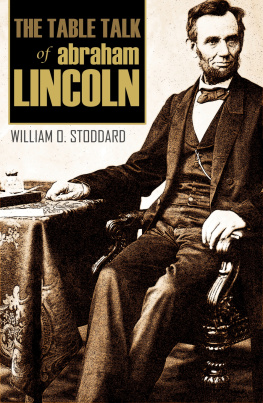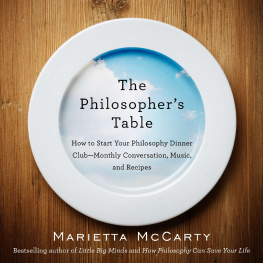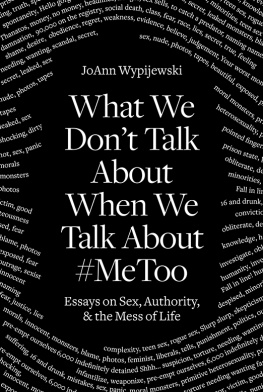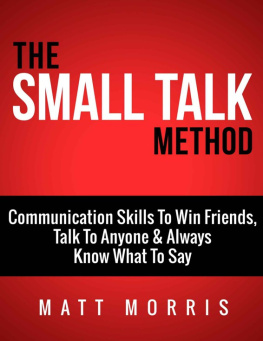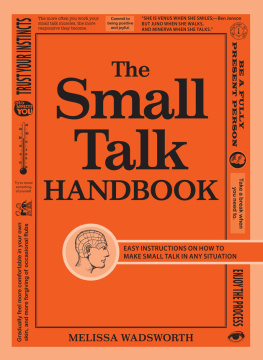


Copyright 2015 The Threepenny Review
All rights reserved under International and Pan-American Copyright Conventions. No part of this book may be used or reproduced in any manner whatsoever without written permission from the publisher, except in the case of brief quotations embodied in critical articles and reviews.
Library of Congress Cataloging-in-Publication Data Is Available
ISBN 978-1-61902-503-5
Cover design by Emma Cofod
Interior Design by E.J. Strongin, Neuwirth & Associates, Inc.
COUNTERPOINT
2560 Ninth Street, Suite 318
Berkeley, CA 94710
www.counterpointpress.com
Distributed by Publishers Group West
10 9 8 7 6 5 4 3 2 1
CONTENTS
The idea for Table Talk came from Leonard Michaels. Lenny, who had been closely involved with The Threepenny Review since its inception in 1980, was always coming up with new plans for the magazine, and most of them were horribly impractical. One that I particularly remember, for instance, was his suggestion that we expand into book publishing. We could bring out novels that no one else wants to publish, sell them for one dollar each, and make a million dollars, he said in his extravagant, vowel-lengthening manner. I gently informed him that this business strategy would cause us to lose our shirts, and he backed off.
But Table Talk, which he came up with about ten years into Threepennys existence, was an excellent idea, and it has lasted. I dont know whether Lenny took the title from Hazlitt, who used it for several editions of his essays, or from Coleridge, whose literal table talkthat is, his dining-room conversationwas championed by his friends and acquaintances as better than anything he ever put on paper. Whichever. We were both happy to have an allusion to the nineteenth century in our late-twentieth-century magazine.
In their first incarnation, the Table Talk entries were anonymous, or signed just with initials, but we soon decided that was too coy and moved on to fully signed pieces. The only firm rules were that they had to be short (the offical upper limit was a thousand words, though some people have been allowed to exceed it) and that they would appear at the front of the magazine. We never insisted that the material be strictly conversational in mode: Threepenny editors know the difference between writing and speech. On the other hand, we always hoped that the tone would be a bit looser and quirkier in these pieces than in the longer Threepenny essays.
Some people took to the form with great panache, and these Table Talk reliables duly make more than one appearance in this anthology. Lenny himself, Bert Keizer, and W. S. Di Piero have all been given three selections each because they were all great Table Talkers who racked up many entries over the years. August Kleinzahler, Thomas Laqueur, Arthur Lubow, Irene Oppenheim, Nick Papandreou, and Michael Ryan are also well represented, with two entries each. If I have more than one entry (and I do), it is because my Table Talk count is more than twice as high as that of any other human being on the planet. When deadlines approach and we are short of Table Talks, I write one myself; or else I get my deputy editor to write one, which helps explain why five of these deputiesMimi Chubb, Kathryn Crim, Francie Lin, Lisa Michaels, and Jennifer Zahrtalso appear here.
Its fun to look through this list of contents and see who shows up on it. Some are those you might expect, the writers who have made Threepenny what it is by writing for it frequently over the years. At least twenty of these beloved regulars are here, ranging alphabetically from John Berger to Dean Young. (That Dean Young piece, by the way, started its life as a paragraph in a casual letter he wrote me, and then got turned into a Table Talk piece because I wanted to share with everyone the typical delights of a Dean Young letter.) Others are admired authors whom I managed to snag for the magazine by offering them this one brief assignment; these unusual literary lights include (among others) the Russian-Canadian fiction writer David Bezmozgis, the critic and writing professor Susie Linfield, the novelist Claire Messud, the philosopher Alexander Nehamas, the former labor secretary Robert Reich, and the cultural historian Luc Sante. There are some close friends of mineCharlie Haas, Tim Savinarwhose dinner-table conversation actually led me to say to them, That would make a great Table Talk! And there are people Id never met or previously heard of, like Douglas Danoff, Mert Erogul, and Ben Merriman, whose pieces simply drifted in through the mail or, lately, the online submissions system. I always tell young writers that Table Talk is the easiest way to get into the magazine, and apparently this is true.
The collection starts in the winter of 1990 because that was when the first Table Talk appeared in the magazine; it stops in the summer of 2013 because we had to stop somewhere, though Threepenny has continued to bring out a dozen or more of these pieces every year. The anthology includes less than a third of all our Table Talks to date, with the selections chosen in part for their individual piquance, in part for their variety, and in part for their serendipitous overlaps. This kind of writing represents only one small section of the magazine, not the whole thing, and yet I think it is true to something essential about The Threepenny Review. But whether that essential thing is tone, or subject matter, or style, or topicality, or lack of topicality, or some inscrutable combination of all those is more than I could say.
For obvious reasonsat least, I hope they will become obvious as you read throughJennifer Zahrt, Mimi Chubb, and I decided to arrange these pieces chronologically. The selections can be read in any order you choose, but something additional accrues if you read them in the order in which they first came out. We made only one exception to this rule, and that is the final essay: one of Leonard Michaelss early pieces, a favorite of mine. If he had lived, he would still be trying out ideas in this form he invented, and I thought it only fair to give him the last word as well as the first.
WENDY LESSER

S tacks of every back issue of The Threepenny Review can be found resting together on purpose-built shelves in a single room at the Threepenny offices. I was born around the same time Wendy Lesser founded the magazine, so this archive of issues effectively compartmentalizes my life into quarterly segments. When given the task of reading every Table Talk ever written for our pages, I began to relive my youth, beginning with the winter of 1990.
For two months, I sat at a glass table with a pile of twenty-three years of Threepenny before me. I read each piece in sequence, a total of nearly three hundred Table Talks, with the goal of selecting the most representative and interesting half. (Before we finished, Wendy would further narrow my choices to the ninety-nine found here.) As I encountered each Table Talk for the first time, I was treated to a crash course not only in the history of Threepenny as a publication, but also the history of the end of the twentieth century andmost surprising to memy own perceptions of growing up in America during those years. The references to current affairs of the early Nineties reminded me of what I was doing then, and how
Next page



